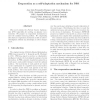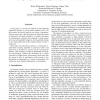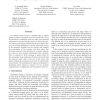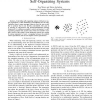SASO
2008
IEEE
14 years 9 months ago
2008
IEEE
SASO
2008
IEEE
14 years 9 months ago
2008
IEEE
This work extends the Particle Swarm Optimization (PSO) algorithm for working on dynamic environments. We propose an evaporation mechanism to solve the outdated memory problem. We...
SASO
2008
IEEE
14 years 9 months ago
2008
IEEE
Self-management is one of the challenges for realizing Ambient Intelligence in pervasive computing. In this paper, we propose and present a semantic web based selfmanagement appro...
SASO
2009
IEEE
14 years 10 months ago
2009
IEEE
In this paper, we present an analysis of self-organizing bandwidth sharing in priority-based medium access. For this purpose, the priority-based Access Game is introduced. Analysi...
SASO
2009
IEEE
14 years 10 months ago
2009
IEEE
—We consider here multi-agent patrolling as the task for a group of agents to repeatedly visit all the cells of a discrete environment. Wagner et al. [1] have introduced patrolli...
SASO
2009
IEEE
14 years 10 months ago
2009
IEEE
—The complexity of distributed computing systems and their increasing interaction with the physical world impose challenging requirements in terms of adaptation, robustness, and ...
SASO
2009
IEEE
14 years 10 months ago
2009
IEEE
An optimal sensor layout is attained when a limited number of sensors are placed in an area such that the cost of the placement is minimised while the value of the obtained inform...
SASO
2009
IEEE
14 years 10 months ago
2009
IEEE
This paper introduces MOCAS (Model Of Components for Adaptive Systems), a generic state-based component model which enables the self-adaptation of software components together wit...
SASO
2009
IEEE
14 years 10 months ago
2009
IEEE
Abstract—Controlling self-organizing systems with given control parameters is often unintuitive and inefficient for the user. Typically, there is some emergent behavior that the...
SASO
2009
IEEE
14 years 10 months ago
2009
IEEE
Swarming agents often operate in benign geographic topologies that let them explore alternative trajectories with minor variations that the agent dynamics then amplify for improve...





